#example of a synthesis paper
Explore tagged Tumblr posts
Text
I think there is a difference between the comic as a sequence of images with text and the comic as a comic. it's a subtle difference that an untrained eye might not see but the more one as artist draws comics the clearer this difference becomes, because one who first aspires to draw comics will soon find they are merely drawing sequences of images with text.
when people say an artist is clearly inspired by anime they often use "anime" to refer to japanese pop culture in general, but if you look more closely you can often tell it really is specifically anime rather than manga that inspired them, because the paneling and camera angles in their comics will read like a series of anime screenshots rather than a manga page. similarly, when I was a teenager really popular manga that had anime adaptions would sometimes get "animanga" reprints where they replaced the panels with the equivalent anime screenshots of the scene, and they often looked like dogshit because the very premise showed blatant disregard for why the original comic worked in the first place. these two examples are both about anime because i am a weeb but it applies outside that context too. a cartoon storyboard can be read as if it were a comic, but what it really is is a sequence of images with text that has yet to be refined into its actual intended format.
there are many artists who only employ the medium of comic because what they actually want to draw is a video, or a video game cutscene, but the only tool actually at their disposal is the ability to draw a series of images and add text to them so that is what they use. there is no shame or mistake in doing this, you have to make your art with the tools that you have available, and if the sequence of images with text is enough to convey the idea then it was the right tool for the job. but these are different mediums with different visual languages, languages which have a lot of overlap and can occasionally be used in each other's stead to achieve similar results (especially when drawing a fanart comic of a video game for example), but which are still ultimately different. the comic and the video and the cutscene are all different forms that a sequence of images with text can take but they are far from completely interchangeable.
there is a key difference in approach to the comic as a series of images roughly interchangeable with other forms of series of images like the video and the cutscene, and the comic as specifically the comic. this difference in approach is not always necessary to achieve results, an artist who wants to convey a scenario they came up with needs only the sequence of images with text to achieve this. but the difference between a comic with good writing and art, and a comic that is a good comic, is in whether it was treated as a comic rather than a sequence of images with text. I say this as an artist whose nearly every comic has been simply a sequence of images, because I just don't have the patience to refine it into a comic when I merely want to convey my idea rather than draw a comic. it takes a particular skill and insight that have to be developed and practised separately from the ability to draw well and the ability to write well in order to become good at making "the comic" as synthesis of the two.
it's hard to specifically point out the essence of this difference between the sequence of images and the comic because it's kind of a vibes thing honestly, and it depends on where and how the comic was meant to be published too. comics meant to have paper print editions have different constraints and requirements and frameworks to work with than webtoons meant to be read on slim mobile screens in a continuous scrolling format. a good traditional comic will consider not just how each individual panel looks but also the way each page as a whole looks, and how the pages look next to each other in a spread, and how it feels to turn the page towards the next spread. a good webtoon will consider the movement of scrolling down and how this affects the transition from one moment to another in its composition. time is time in videos and cutscenes but space is time in comics, and the space your have available determines how you can divide time across it. when you make a webcomic on your own website you have no constraints but the ones you set for yourself, and sometimes this leads to things like homestuck, which would not work in any other format than the one it created for itself.
the best comics are good because they tell their story and present their images specifically in the form of a comic, in a way that would not be possible if it were not specifically a comic. I think this is true for basically every medium, I'm just thinking about comics specifically lately, because even though I don't really consider myself a comic artist - because I usually draw sequences of images rather than comics - the thing my clients want to pay for is often still "a comic", and they don't know or care to tell the difference. it's a difference that, as established, is often fairly moot anyway, because as long as it successfully conveys your idea it's good enough. but it's precisely because the sequence of images is often good enough that the specific skill of the comic artist is often overlooked.
1K notes
·
View notes
Text

So, I've missed #Koopaling #Week for about five years in a row, but this time I didn't want to so I decided to make a quick little thing for each of my guys. But, since I've always wanted an excuse to share these thoughts on the internet, on each thing I will also be including a little spiel about my own interpretations of their characters, which are a synthesis of dubious-smelling but officially-licensed materials, 2000s koopaling fansites, and years of playing pretend. So don't go citing any of these in your mario research papers. Perchance.
First, the baby of the bunch: LARRY! Larry is the runt of the litter (besides bowser jr, because yes i am a King Dad Truther), and he's constantly getting the short end of the stick. He didnt even get a cool punk musician as his namesake, he "just looked like a larry". Because he is the runt he was constantly overlooked as a child, which enabled him to develop a real sneaky streak in cheating and stealing and doing generally underhanded things while nobody noticed. He loves gaming and eating and actung like a 14yo boy but he also has some deeper interests as well. For example he is very into tennis, of course at which he cheats, but he loves it. In mario and sonic at the olympics he also discovered that he has a passion for equestrian sports, which is really, really, really, really, funny. In my head he is voiced by Rob Paulsen.
172 notes
·
View notes
Text
to be honest at this point i think the way people talk about 'attention span' has become entirely detached even from assessment of the very same tasks a robust 'attention span' supposedly allows one to complete..... like ok me for example, by paper definitions i am very distractible etc (<- 2 professional & prescribed-for ADHD diagnoses not actually relevant to this but by the standards of accepted proof they are so, sure i'll throw those in) but i am also someone who is finishing postgraduate studies in humanities & i am generally considered to be capable of functioning in a white collar 'professional' workplace, not because anybody likes how i accomplish tasks but because well. i get results. & no these are emphatically not settings where i like 'mask' rampantly like even on stims i do not engage in a workflow that would be approved of by studyblr or stimulant startups or conventional wisdom on productivity & yet by objective measures i am in fact a pretty productive worker. more than i should even bother tbh like it's loserish. almost as though these concepts of 'attention' & functional practical skills speak seldom to one another, almost as if the required skills of literacy & information synthesis have actually changed somewhat since the pedagogues of the early modern period articulated their more psychological counterpart concepts, hmmmmm
88 notes
·
View notes
Text
So about the Bibliox misspelled words= ost titles theory (ish), there are some very interesting possibilities for SYNTHESIS as a future ost.(Longish ramble below)
A darkener’s role and backstory mostly depend on the determination a lightener gives them, from what we’ve seen. For example, Ramb was special to Kris, so he appeared as a more fleshed out character who knew Kris better (relative to other darkeners). Also, this probably explains why some objects become characters while others become slightly different items—like how a lightener would determine a pencil as a tool, so it would remain that way in the dark world, albeit in a different form.
Asgore’s flower shop. Basically confirmed at this point to be the next dark world, created in “an inferno of jealousy”. Now, it’s not totally clear what Asgore could be jealous about (yes I know Sans but also there could be other factors with the whole “incident” that happened) but if it IS something related to Toriel, I’m guessing the labor and care spent on his wedding flowers would not go unnoticed. Given how determined he’s been to preserve them, they could definitely play a big role in the dark world.
Now, I’m not saying Flowey will return— at least, not in the clickbaity FLOWERY WASF THI KNICHGT 😱😱😱 HE RETURNED FROM UNDERTALE TO KILL US ALL kind of way. As important as the concept of “dusteners” like Gerson are to the story, there never really WAS a Flowey to revive in the first place in DELTARUNE (that we know of), so it would be REALLY unlikely that THAT Flowey would appear. However, what if each wedding flower acted like a parallel Flowey in a way (similar to the Ralsei clones from @lynxgriffin ‘s Paper Trail)?
It would be really interesting if you met each flower in different sections of the dark world and had different challenges or themes based on them (and maybe their soul color), and if at the end, you meet the golden flower, who you would expect to appear most like Flowey, but he’s (or its?) actually something even more messed up, like Asgore’s desperation to go back to the way things were before became so desperate that it just became this amalgamated mess of emotions and complicated situations.
Hence, SYNTHESIS: Both representing some sort of creepy, lab experiment sort of vibe and also photosynthesis, because, you know, flowers.
Also not AS connected, but interesting) all of the Bibliox misspelling soundtracks mentioned seem to take place when it’s tense. Synthesis seems like it would be similar in tone to Amalgam or Here we Are, which, yeah. True Lab. Tense.
Anyway I’m not betting on Flower boi’s distant cousins’ appearance(es?) or anything, but it’s fun to think about lol
Have some free doodle for making it this far
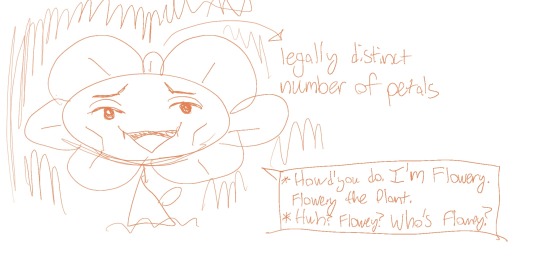
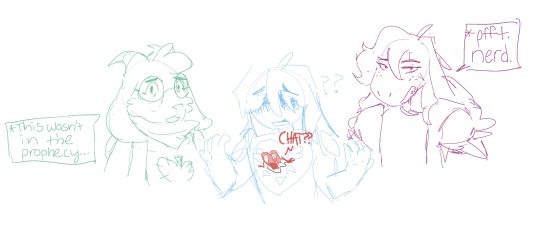
#utdr#deltarune#not art#deltarune spoilers#Flowey#ralsei deltarune#susie deltarune#kris deltarune#Undertale#I don’t normally post my theories/rambles but I haven’t really heard many people talking about this one so sure why not#Or maybe they are idk lol I just think for fun
26 notes
·
View notes
Text

NASA Shares New Views of our Galactic Neighbor, Andromeda
The Andromeda galaxy, also known as Messier 31 (M31), is the closest spiral galaxy to the Milky Way at a distance of about 2.5 million light-years. Astronomers use Andromeda to understand the structure and evolution of our own spiral, which is much harder to do since Earth is embedded inside the Milky Way.
The galaxy M31 has played an important role in many aspects of astrophysics, but particularly in the discovery of dark matter. In the 1960s, astronomer Vera Rubin and her colleagues studied M31 and determined that there was some unseen matter in the galaxy that was affecting how the galaxy and its spiral arms rotated. This unknown material was named “dark matter.” Its nature remains one of the biggest open questions in astrophysics today, one which NASA’s upcoming Nancy Grace Roman Space Telescope is designed to help answer.
This new composite image contains data of M31 taken by some of the world’s most powerful telescopes in different kinds of light. This image includes X-rays from NASA’s Chandra X-ray Observatory and ESA’s (European Space Agency’s) XMM-Newton (represented in red, green, and blue); ultraviolet data from NASA’s retired GALEX (blue); optical data from astrophotographers using ground based telescopes (Jakob Sahner and Tarun Kottary); infrared data from NASA’s retired Spitzer Space Telescope, the Infrared Astronomy Satellite, COBE, Planck, and Herschel (red, orange, and purple); and radio data from the Westerbork Synthesis Radio Telescope (red-orange).
Each type of light reveals new information about this close galactic relative to the Milky Way. For example, Chandra’s X-rays reveal the high-energy radiation around the supermassive black hole at the center of M31 as well as many other smaller compact and dense objects strewn across the galaxy. A recent paper about Chandra observations of M31 discusses the amount of X-rays produced by the supermassive black hole in the center of the galaxy over the last 15 years. One flare was observed in 2013, which appears to represent an amplification of the typical X-rays seen from the black hole.
These multi-wavelength datasets are also being released as a sonification, which includes the same wavelengths of data in the new composite. In the sonification, the layer from each telescope has been separated out and rotated so that they stack on top of each other horizontally, beginning with X-rays at the top and then moving through ultraviolet, optical, infrared, and radio at the bottom. As the scan moves from left to right in the sonification, each type of light is mapped to a different range of notes, from lower-energy radio waves up through the high energy of X-rays. Meanwhile, the brightness of each source controls volume, and the vertical location dictates the pitch.
This new image of M31 is released in tribute to the groundbreaking legacy of Dr. Vera Rubin, whose observations transformed our understanding of the universe. Rubin’s meticulous measurements of Andromeda’s rotation curve provided some of the earliest and most convincing evidence that galaxies are embedded in massive halos of invisible material — what we now call dark matter. Her work challenged long-held assumptions and catalyzed a new era of research into the composition and dynamics of the cosmos. In recognition of her profound scientific contributions, the United States Mint has recently released a quarter in 2025 featuring Rubin as part of its American Women Quarters Program — making her the first astronomer honored in the series.
NASA's Marshall Space Flight Center in Huntsville, Alabama, manages the Chandra program. The Smithsonian Astrophysical Observatory's Chandra X-ray Center controls science operations from Cambridge, Massachusetts, and flight operations from Burlington, Massachusetts.
22 notes
·
View notes
Text
I understand that the movies are meant to be external to the flow of the main narrative, but the development of Izuku and Rody’s friendship could so easily have been used as a guide for the ‘save the Villains’ narrative to resolve more effectively. To demonstrate what I mean, here’s a breakdown of their relationship arc as well as I can remember it:
I - First Impressions
Izuku initially attempted to arrest Rody for assisting a jewel heist, only to be called out for acting outside the law (bc they’re in a country where Izuku does not have jurisdiction as a hero).
He nevertheless demands to search Rody’s briefcase which is, again, illegal regardless of whether Rody actually stole anything (he did, though the briefcases being swapped makes it look like Izuku was mistaken). Izuku is acting as a vigilante here while still expecting his position as a hero student to cover his ass.
Despite this, when Otheon police arrive with a show of grossly excessive force and no regard for due process, Izuku’s priority immediately becomes saving Rody. The legal authorities are in the wrong, the system cannot be trusted, so Izuku very publicly opposes them.
Naturally, this decision places Izuku firmly outside the protection of the law, and he is punished by being framed for the murder of 12 civilians by a government under the extensive influence of a quirkist - in this case, anti-Quirk - cult, Humarise (which could be seen as a parallel to the HPSC’s corruption/shadowy assassin operations).
II - Thesis & Antithesis
Later, while on the run, Izuku and Rody engage in a dialogue in which Rody critiques Izuku’s black-and-white moral dichotomy: Izuku claims that they can’t return the briefcase of encrypted evil-scheme documents to Humarise because they’re Villains, and Rody snaps back that not everyone has the luxury to be so righteous.
(Rody’s backstory has pretty obvious parallels to Twice’s: being denied honest work and alienated from society for reasons outside his control, leaving crime the only viable way to make a living. He also parallels Hawks in that this alienation is a consequence of his father’s crimes, in addition to the ‘Otheon gov’t under Humarise = HPSC’ idea.)
Izuku does not stubbornly argue Rody’s point but instead switches to the more pragmatic argument that a big, shady organization like Humarise wouldn’t just let them walk away after handing over the papers; they would most likely kill them both to tie up loose ends. (He is proven right about this shortly after.)
III - Synthesis
And here we come to a turning point: Rody ignores Izuku’s instructions and sneaks out at night to deliver the briefcase to a Humarise agent who, as predicted, tries to kill him after obtaining it. But despite having been ‘betrayed,’ Izuku once again rushes to protect Rody from the threat he created (or rather, made immediate).
When Rody demands to know why Izuku would save him after what he did, Izuku responds simply that he’s trying to be a hero who saves people, and he doesn’t see why that should exclude someone like Rody. (Izuku references this worldview in the main storyline wrt Aoyama and Lady Nagant: “Doing something wrong doesn’t mean you’re a Villain forever.”)
This reintroduces their discussion of who has the privilege to behave heroically. Rody, like multiple other characters , assumes that Izuku has had an easy life thanks to his flashy, powerful, heroic Quirk. But unlike with, for example, Shinso or Monoma, Izuku directly refutes this and (without revealing OfA and his former quirklessness) talks about his own hard journey.
(Which is crazy because Izuku is not someone who does this. He is committed to becoming a Symbol like All Might and saving people with a smile, not letting them see his internal struggles. He doesn’t even take the hero mask off in front of his friends in 1-A: as early as the Sports Festival arc, he tells Shoto that he’s always had the support of others when this is transparently untrue.)
IV - Conclusion
In the end, Rody chooses to help the heroes stop Humarise and then, with his family history no longer hanging over his head in the same way, returns to legal work (bartending) with plans to pursue his dream job (piloting). This isn’t because Izuku managed to change his fundamental values/ethics: his priority is and has always been providing for his family and keeping them safe.
Izuku’s influence consists in the belief that there may be other ways to accomplish those things. And while Rody does have to take a leap of faith (not caving to the Humarise leader’s threats against his siblings because he trusts that he and Izuku working together can stop the cult before those threats are realized), his decision to ‘go legit’ is the result of material changes in his circumstances. He can now afford to act within the confines of the law.
25 notes
·
View notes
Text
Review: TRANS/RAD/FEM by Talia Bhatt
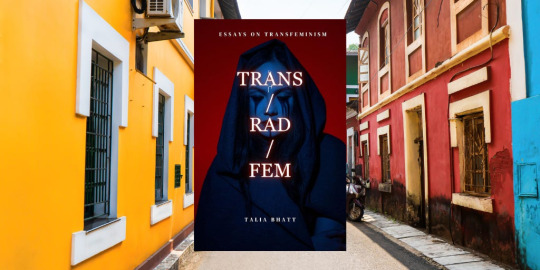
Originally published on Transcendent Books.
There is a spectre that hangs over modern feminism and queer theory—the radfem. That belligerent hag, her face contorted in stupid and impotent rage, distorted meme after meme. She gnashes her teeth at the patriarchy but, ever the bumbling fool, in her hysteria she merely spits at other women—and at perfectly reasonable and feminist men. Finally, the radfem, having been thoroughly ridiculed for her misplaced activism in polite society, descends to thrashing in anti-transsexual rage somewhere in the bowels of the internet. She crystallises into her final form: a TERF. Proof that her cause was whispered to her by the devil from the very start.
And so by her example is every feminist chastised. Don’t get too feminist with it now. You’re not a hysterical, man-hating, unwashed, shorn-haired, un-lipsticked radfem, right? In the same breath, every trans person is warned away from feminists. You never know when one will shed their womanly skin and reveal the witch beneath—right? Above all, you should never actually read anything radical feminists have said or theorised. That would only corrupt you. Right?
Enter Talia Bhatt: a trans woman that reads. And writes. God, does she write.
To say that Trans/Rad/Fem is (only) a collection of essays is to undersell it tremendously. It is a visionary creed and a dissection; it is one woman’s reckoning with decades upon decades of epistemic erasure. With academic papers that buried her people’s lives; with vapid allies that patted her back with one hand and shut her mouth with another. It is written with the verve of a general and the piercing oracular gift/curse of Dworkin. It is nothing less or more than a recitation of truth. Truth you already know, but must not name.
Because here’s what happens when you actually read the damned thing: you stop seeing spectres. Or quasi-religious corruption. You begin to understand. To ask questions—and to arrive at answers.
Trans/Rad/Fem is both a synthesis of the best of radical feminism with transfeminism, and a thorough beating of the worst. From Bhatt’s veneration of Wittig and respect for Rich, to her searing contempt for Raymond and disgust with Nanda, she takes a scalpel to the second wave and examines its innards through the lens of a brown, Indian trans woman living today. What is born in synthesis is not merely critique—it is a whole new body of work. Though Bhatt is underpinned by years of prior scholarship, the burning core of her theory is spun from her own life, her own flesh. And the lives of all those that are not, as a rule, allowed to speak: female, racialised, lesbian, trans.
We are told to measure regimes by the fortunes of their most abject. Trans/Rad/Fem thoroughly makes that case for the patriarchy writ large. The depth of its depravity is seen most clearly through its whipping girl, its third sex: the trans woman. And so it is fitting that she must be the one to lead feminism's new chapter towards liberation. To quote,
Now is the time for the damned to have their due, for the wails of the forgotten to echo above the “civil”, silencing din. Now is the time for all those whose struggles have been erased, co-opted, recuperated, disrupted, and sanctified to make themselves known. Now we will speak, and you will, for the first time, LISTEN.
I hope that you do. I hope that you accept this chance for understanding, for solidarity, for knowing.
I hope that you read the damned book.
#transfeminism#material feminism#lesbian feminism#feminism#sex is a social construct#trans/rad/fem#talia bhatt
42 notes
·
View notes
Note
How is Makoto naive? /genq
already we're going with the definition of "(of a person or action) showing a lack of experience, wisdom, or judgment." and then focusing in on "experience"
Makoto is naive in the sense that he lacks certain experiences and knowledge and as such works from an incomplete biased mindset.
To be VERY clear when I say naive I'm not saying "baby boy who knows nothing" im saying "person who has been mostly sheltered by the oppressive caste system running his society and actively kept from seeing anything to contradict this world view of everyone having a good experience and time with it."
Makoto lacks the experiences to have a full grasp on Hope's Peak and talent, while we as an audience get everything we really need to know, a lot of the conversations and reveals about the darker side, the people crushed and killed for talent to look so shiny and perfect are things Makoto is not privy to.
For example. when Izuru talks with Komaeda about how he was taught to see the talentless as leeches, Makoto is not privy to this conversation. When the parade happens, Hope's Peak is purposefully putting out information and narratives to keep the talented students ignorant to the actual reasonings of the parade. Makoto does not know the truth, and is not allowed to find the truth. Along with this, if its not society or a specific person keeping him from things, its his luck, for instance, the time Junko just straight up lobs a wrench at him in dr3 only for Makoto to slip on a paper and completely notice nothing happened at all.
Makoto is naive when it comes to talent and hope's peak specifically, because he does not have the full picture on what Hope's Peak is, only what he was told and specifically shown about it. Makoto is the success story of Hope's Peak, the embodiment of what it should be used for and done for.
He's of the people and for the people, he uses talent to help and aid, he's the part of Hope's Peak that is good. The part of Hope's Peak that uplifts kids in poverty like Souda or Akane and gives them the resources they need to make something of themselves. The part of Hope's Peak that truly does genuinely help people and make the world better. It connects people to resources they need in a lot of cases and gives them the respect to be taken seriously in their fields.
He is the lucky winner who gets brought in to Hope's Peak, the success story, the person who gets in and makes the world better through the power of Hope Peak's help. He is that one in a million feel good story, the "anyone can do it" every man. He knows the good of the program intimately, but knows nothing of the trail of bodies it left to get him that experience.
So, in this one facet, he is naive, because he is the good of the system embodied, countered by Hajime who is the bad of the system embodied. Shuichi performs a synthesis of the two, with his more neutral experience able to let him see both sides of the coin with more clarity to see beyond the bells and whistles of "Talent" or "Hope" to get to the actual heart of the matter which is "no matter what you call it, no matter what you say its for, a system that uses human lives like poker chips cannot be allowed to exist uncontested, hope, despair, talent, if it does not see a person, any person, as a person, it is dangerous"
14 notes
·
View notes
Text
Zotoro, Scihub, and more Cool Hypnosis Papers
CW: severe nerdery
I don't have an academic background, and while I've been poking around at hypnosis nerdery for a while, I was limited to an extent by what I could get my hands on.
This is especially important when it comes to the academic texts. There's only so many books out there on theory, and a bunch of it doesn't make sense until you go back and read the actual papers.
For example, I knew that Kirsch had something to do with placebo and expectations, but I only had a vague understanding of what and how. A paragraph critique in Theories of Hypnosis wasn't enough to give me the proper context.
Until I decided I was going to rewrite the newbie guide to explain hypnosis from a modern neuroscience perspective and then I was committed to pulling the citations and digging up the actual papers.
At first I was doing it by hand by pasting things into Scihub and downloading the PDFs. This sort of worked, but at some point there are just too many PDFs and it's work to keep them consistent.
This is where Zotero comes in. It's a PDF database that is set up to scan for academic fields and give you a UI for finding, reading and annotating the PDFs. It syncs between MacOS, Windows, and iOS and keeps the annotations and highlights. And even better, it's got plugins.
Specifically, it's got a plugin for Scihub. You can add a DOI number and it'll pull the abstract data for the paper, and then you can right click and it'll download the paper from Scihub automatically.
It doesn't cover everything. Some stuff is too new for Scihub, and I've had to fallback to https://reddit.com/r/scholar to request articles, but there's so much stuff.
In particular, you get the sense of how academic papers can be a conversation, an argument, or a lawsuit. You get to see the most brutal putdowns phrased as passing comments. And the grudges and ego can go on for decades.
There are a couple of papers that I recommend everyone read, because they're just great at summarizing the field and current thinking.
The response set theory of hypnosis reconsidered: toward an integrative model
I love this paper not just because it goes over response expectancy theory from the inception to the general whittling down from "Once expectancy effects are eliminated, there may be nothing left" to response expectancy as 25%-35% of suggestibility and the addition of a "readiness response set" to cover the rest of it... but also because despite Kirsch's hand in response set theory and response expectancies and being in a journal issue devoted to Kirsch's career and achievements, he is not an author to this paper that is reconsidering his work. Instead, he gets a hand clap.
In closing, Irving Kirsch has greatly advanced our understanding of hypnosis. The construct of expectancies that he articulated and championed for decades has well withstood the test of time and replication. We extend our personal gratitude to him for his shaping influence on our personal views of hypnosis and for his many contributions to the field of hypnosis that he so immensely enriched.
I'm not sure what I'm looking at, but I love it.
How Hypnotic Suggestions Work – A Systematic Review of Prominent Theories of Hypnosis
This is a preprint, but it's comprehensive not just in how it picks out theories of hypnosis that are more recent than the book, but also in how it pokes holes and points out weak points in the various theories. It's also recent enough to talk about fun new things like predictive coding and interoception and somatosensory feedback.
Hypnosis and top-down regulation of consciousness
Devin Terhune's papers are always good to read. His papers read like a story where every chapter builds on the last one. This one is a "synthesis of current knowledge regarding the characteristics and neurocognitive mechanisms of hypnosis" and I can't tell you how many times I've read through this paper by accident because I wanted to pick a point out of it and got sucked into it all over again.
82 notes
·
View notes
Note
How does one survive PhD applications (and/or postdoc applications)?
Haven't applied for a postdoc, have no intention of ever doing so (I intend to go straight into industry because I'm in a field where you can do that and it's a good idea.)
If you're asking me this because you're a senior in undergrad who wants to apply for a PhD, it's a bit late for that! Most deadlines in the US are Dec. 1. My recommendation if you're in this situation is to try and get hired for a short-term research position at your university (if you've done undergrad research) and apply next fall.
PhD applications— my advice is extremely specific to the physical sciences (and the US), so keep this in mind. (That is to say, this assumes you don't have a master's.)
-If you've not done any undergraduate research or worked in industry for a while you're fucked for right now. Go work in industry for a bit.
-If you've done undergraduate research, make sure you have a good relationship with your PI and get them to write you a killer letter of recommendation.
-Get really good relationships with at least two other research faculty at your university; make sure they know the research YOU'RE doing and are interested in, and make sure you know the research they're doing. They'll write you better letters that way.
-Research the faculty at the schools you are applying to— DO NOT GO SOMEWHERE BECAUSE IT IS A BIG NAME UNIVERSITY. GO THERE BECAUSE IT HAS PEOPLE DOING WHAT YOU LIKE. (preferably at least 3, though given my experiences I'd suggest at least 5; sometimes funding falls through, or you don't get along with groups, etc.)
-Incidentally, if you're not sure where to start looking for people doing things you like, ask your undergrad PI or other faculty doing things you like at your undergraduate institution.
-If it isn't discouraged, around the time you apply, start talking to the people that you're interested in at the universities you apply to about their research— they can't generally automatically give you a thumbs up (that's up to the admissions committee) but they'll be a strong thumb on the scale if they like you.
-As an extension of this, make sure that you have a vague idea of the sort of topic you'd be interested enough in to spend five to seven years working on it to the exclusion of everything else. You may think you "like everything"; I think it's actually better to focus on what you dislike and think about if certain topics will be having you do a lot of what you dislike for six years. (If you don't like column chromatography, for example, don't prioritize organic synthesis labs.)
-The research statement: Some of these are really fucking short (<500 words). Some are longer. This should be about what you're interested in careerwise, not about your personal background. It should explain why you're interested in that specific university as well (mention facilities, faculty members, recent publications).
-The personal statement: Should roughly be a "and here's why I'm a scientist" sort of thing. Can have personal history elements, sad backstory, etc. but don't lean too hard on the traumadumping.
-The CV: Since you've probably not gotten a lot of papers out as an undergrad, this is basically going to be a lot like a normal resume, but with a "Publications" section (include any time you presented at an undergraduate or other research conference here! conference papers are papers too) and an "Awards" section (just academic ones. unless you won the nobel peace prize or something).
-The transcript: Obligatory "you must in fact in almost all cases have better than a 3.0 GPA to get considered for PhDs, better than a 3.2 to go to a good (top 50) school, and better than 3.5 for an ivy" mention goes here.
I recommend getting started on seriously writing shit in at minimum early October, and getting your letters of recommendation locked in by around then as well.
Take your time, understand that you're basically writing a job application, and commiserate with the other people making the same decision as you (but don't judge yourself for how you're doing compared to them). If you're overwhelmed, reach out to people you trust.
Also don't apply for a Ph.D. unless you really really really like what you do (and are mentally stable enough that you cry <1x a week on average.)
7 notes
·
View notes
Note
Paradise Lost or Faust?
Here again I am divided, but it's not so much the head and the heart this time. It's a matter of what we might call "thin" global vs. "thick" local attachments.
I can see that Faust is the greater work. It's the greater work, among other reasons, because, as I said earlier this week, it explicitly resolves Milton's whole devil's-party dilemma by recasting its devil as the antithesis in a historical dialectic its God is glad to oversee, pronouncing finally that all who strive will be saved. It's greater in scope as well, its reflections on mythology and culture extraordinary in their sophistication. Its carnivalesque synthesis of classical and grotesque—of the Mediterranean and the North, of Classicism and Romanticism—already contains all the virtues we ascribe to modernism. But even in matters of pathos, in the tragedy of Gretchen, Goethe has Milton beat. Goethe is also hilarious, Milton humorless. Goethe can play all the notes, while Milton mostly has just the one: sublimity. The British and American Romantics all agreed that Goethe was the greatest writer of their time, and I don't see how it could be otherwise. Faust is lamentably underread today. It could be the greatest work of western literature in the 19th century, at least before the Russians.
And yet, I don't really read German—I taught myself the rudiments of the language once and can putter around haplessly on the facing pages of a translation thinking about this word or that, but no more—and I'm not deeply schooled, though I am shallowly schooled, in the German literary tradition. And I didn't read Faust until grad school. Whereas I've been living with Milton since I wrote my culminating high-school research paper on Paradise Lost, and I can feel his sublime language much more deeply than any poetry I have to read in translation. Furthermore, the whole tradition of English-language poetry after Milton comes in response to him, and in the most diverse ways, poets as different as Blake and Wordsworth, as Dickinson and Lawrence, replying to or echoing their puritan precursor. Poetry and prose: Moby-Dick comes out of Milton, and therefore the whole tradition of the Great American Novel. Frankenstein comes out of Milton, and therefore the whole genre of science fiction. Then there is nonfiction, Milton as one volcanic, perhaps unreliable, fount of liberalism. Areopagitica preceding the Second Treatise of Government and On Liberty, if not the American Constitution itself. If the author of Frankenstein's mother had not quarreled with Milton, to take another example, would the whole course of feminism have been different?
So in theory Faust, but in practice Paradise Lost. In the world at large, I know Faust is the greater book as I know that New York or London or Paris are greater than the city I live. But I still live in my city. In the world I live in, Milton is everywhere and inescapable, as Goethe is not quite.
8 notes
·
View notes
Text
tesrvenkodria | law and order
------------------------------------------------------------------------------
date: july 9 2025. started: 10:28pm ended: pm
the language. yayyy. honestly, I didn't spend much time on it, and idk how the formatting will be because I had a lot of tables, and idk how to like compute that on here. I was indecisive on some stuff, so yeah, if it's messy then.
------------------------------------------------------------------------------





✧˖*°࿐law and order in tesrvenkodria
𓂃 ࣪˖ ִֶָꪆৎ system model: arcano-civil synthesis tesrvenkodria’s legal and law enforcement systems are a hybrid of traditional civil frameworks and an advanced, magically-augmented oversight network. the structure is designed not just to maintain peace, but to harmonize societal order with magical responsibility.
დ࿐ ˗ˋ law & rights ꪆৎ 𓂃 › the auric rights charter: guarantees equal treatment regardless of aura presence, type, or strength. however, “magical safety zones” exist where only registered users may enter. ꪆৎ 𓂃 › registration law: mandatory magical registration by age 18. penalty for illegal aura suppression, fake aura papers, or unauthorized training. ꪆৎ 𓂃 › non-magical advocacy act: establishes an independent council of non-magical citizens with veto power over discriminatory laws.
✧˖*°࿐policing and enforcement bodies
*ೃ༄aurelian peaceguard (APG) – standard law enforcement
𓂃 ࣪˖ ִֶָꪆৎ civilian-focused; handles non-magical crimes, public disturbances, and minor aura misuse. 𓂃 ࣪˖ ִֶָꪆৎ trained in low-tier suppression fields and carry spectral inhibitors (non-lethal aura dampeners).
დ࿐ ˗ˋ operate city-wide divisions including: ꪆৎ 𓂃 › urban patrol units ꪆৎ 𓂃 › transit & leyrail enforcement ꪆৎ 𓂃 › youth & manifestation crisis response
დ࿐ ˗ˋ special unit: spectral readiness task force ꪆৎ 𓂃 › mixed magical/non-magical team trained to respond to sudden aura surges, aura-induced psychosis, or street-level “tone flare” events.
*ೃ༄arcane regulation bureau (ARB) – magical crime division
𓂃 ࣪˖ ִֶָꪆৎ operates under the ministry of magical affairs. 𓂃 ࣪˖ ִֶָꪆৎ handles C-Class and above infractions, black market aura tech, artifact smuggling, and Class B–S level magical threats. 𓂃 ࣪˖ ִֶָꪆৎ composed only of officers with verified C4-class control or higher.
დ࿐ ˗ˋ key divisions: ꪆৎ 𓂃 › relic & contraband seizure division ꪆৎ 𓂃 › aura violation response unit (AVRU): handles illegal magic use, tone mutations, and combat-scale aura breaches. ꪆৎ 𓂃 › aura crimes investigative sector (ACIS): forensics, psychic reconstruction, and spectral memory retrieval.
all ARB agents are licensed for controlled use of mana bracelets, null rings, and dimensional holdfields (for temporary magical suspension).
*ೃ༄the praelex order – high-level magical enforcement
𓂃 ࣪˖ ִֶָꪆৎ autonomous elite unit; officially non-military but operates at S-class authority.
𓂃 ࣪˖ ִֶָꪆৎ founded during the leyline wars, they answer only to the Prime archon and the convergence authority.
დ࿐ ˗ˋ tasked with: ꪆৎ 𓂃 › handling S-class rogue aura users ꪆৎ 𓂃 › suppressing forbidden magic (e.g., unlicensed aura copying, forbidden blood-oath pacts) ꪆৎ 𓂃 › investigating cataclysmic events or leyline ruptures
𓂃 ࣪˖ ִֶָꪆৎ highly secretive. each member undergoes oaths that burn their true aura color from the public registry, making them spectral "ghosts" to all standard scans.





✧˖*°࿐crime classes and magical offenses
*ೃ༄tiered classification system
𓂃 ࣪˖ ִֶָꪆৎ crime tier ꪆৎ 𓂃 › example crimes ꪆৎ 𓂃 › court route 𓂃 ࣪˖ ִֶָꪆৎ civic ꪆৎ 𓂃 › theft, minor assault, aura misuse under D-Class ꪆৎ 𓂃 › high civil court 𓂃 ࣪˖ ִֶָꪆৎ magitek ꪆৎ 𓂃 › unauthorized artifact trade, illegal aura-based business practices ꪆৎ 𓂃 › arcana tribunal 𓂃 ࣪˖ ִֶָꪆৎ felony ꪆৎ 𓂃 › unregistered C-class manifestation, black magic use, forced aura bonding ꪆৎ 𓂃 › arcana tribunal 𓂃 ࣪˖ ִֶָꪆৎ cataclysmic ꪆৎ 𓂃 › S-class flare events, leyline sabotage, magical terrorism ꪆৎ 𓂃 › the praelex order





✧˖*°࿐penalties and punishments
*ೃ༄conventional sentencing
𓂃 ࣪˖ ִֶָꪆৎ used for non-magical or low-impact crimes.
დ࿐ ˗ˋ includes: ꪆৎ 𓂃 › monetary fines (often linked to aura income brackets) ꪆৎ 𓂃 › community service in aura-neutral zones ꪆৎ 𓂃 › house arrest with spectral limiter bracelets
*ೃ༄magical sentencing
დ࿐ ˗ˋ unique punishments for magical crimes, including: ꪆৎ 𓂃 › control class downgrading (temporarily restrict aura access) ꪆৎ 𓂃 › tone dimming (ritual-based tone suppression used only by court order) ꪆৎ 𓂃 › aura tagging (traceable magical signatures visible only to law enforcement) ꪆৎ 𓂃 › spectral reforging programs (rehabilitation through guided aura recalibration)
*ೃ༄high security detainment
დ࿐ ˗ˋ veilhold penitentiary (for A–S Class criminals): ꪆৎ 𓂃 › located on a remote floating leyline island ꪆৎ 𓂃 › surrounded by continuous suppression fields and chronoshift wards ꪆৎ 𓂃 › cells adjust magically to the inmate’s aura resonance
დ࿐ ˗ˋ null zones: ꪆৎ 𓂃 › areas with complete magic suspension (nullified ley access) ꪆৎ 𓂃 › used in political protection, international detainment, and crises

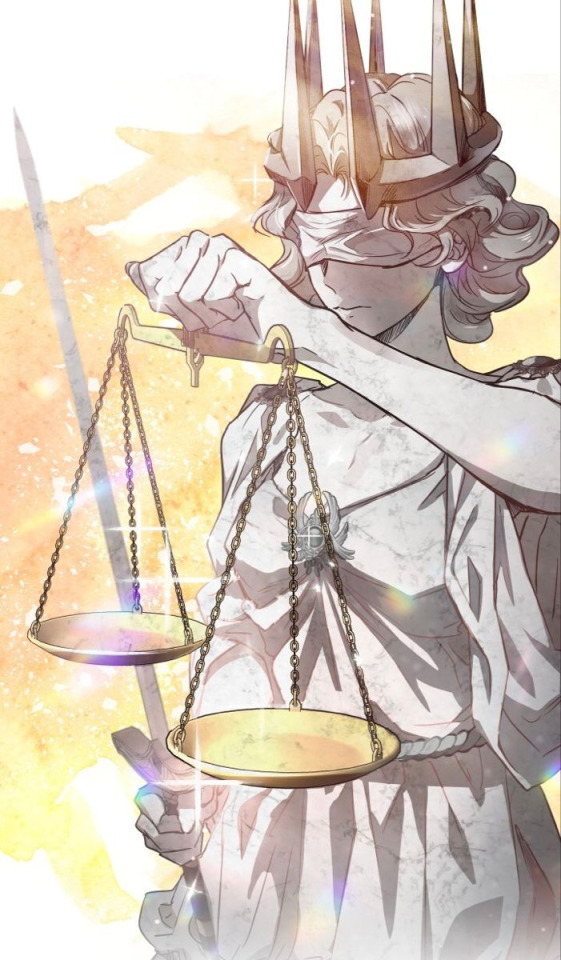
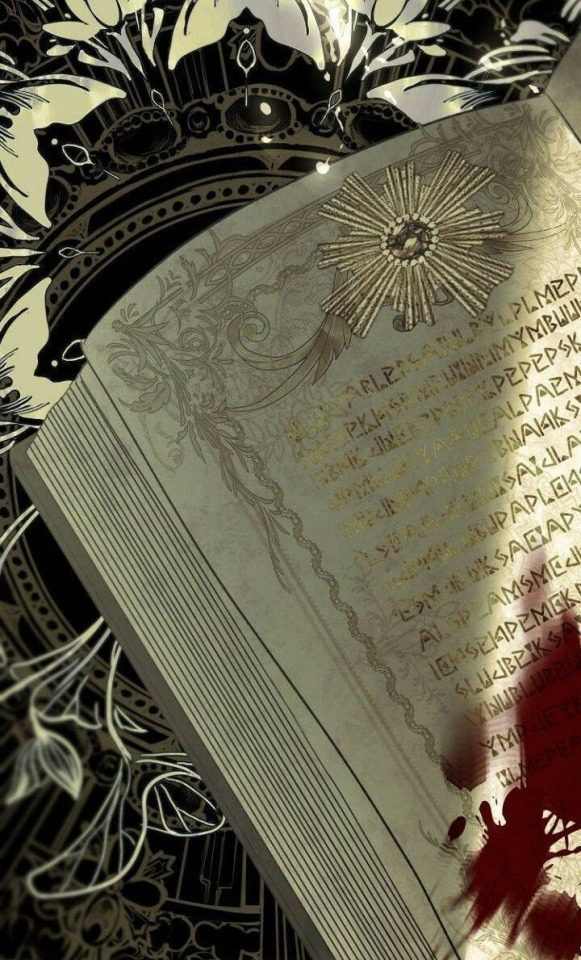


*ೃ༄legal precedents & landmarks
დ࿐ ˗ˋ “the sylvane trials” (1893) ꪆৎ 𓂃 › first modern case of aura evolution under trauma being used in court. ꪆৎ 𓂃 › led to the creation of harmony court and aura trauma law.
დ࿐ ˗ˋ “state v. ferallis” (1976)
established the right to magical silence—individuals cannot be forced to reveal aura class under duress unless there's a national threat.
დ࿐ ˗ˋ “the nullborn protection act” (1999)
ensures that individuals born with null auras (those who suppress magic around them) are not discriminated against or denied public access.





*ೃ༄rehabilitation and magical trauma courts
the harmony court, unique to tesrvenkodria, operates under the principle that aura corruption, trauma, and instability are often the result of environmental, emotional, or societal breakdowns.
დ࿐ ˗ˋ instead of purely punitive justice, harmony courts offer: ꪆৎ 𓂃 › aura stabilization clinics (staffed by empaths, light-toned healers, and mana therapists) ꪆৎ 𓂃 › restorative justice circles where victims and offenders may mediate through guided resonance ꪆৎ 𓂃 › soul mirror sessions — deep magical insight into aura memory patterns, used in therapy or sentencing mitigation
*ೃ༄spectral citizenship and surveillance
𓂃 ࣪˖ ִֶָꪆৎ all citizens over the age of 7 are assigned a spectral ID code tied to their national registry entry.
დ࿐ ˗ˋ spectral data includes: ꪆৎ 𓂃 › manifestation age ꪆৎ 𓂃 › power & control class ꪆৎ 𓂃 › aura color & tone readings (updated every 5 years or after major events) ꪆৎ 𓂃 › criminal record if applicable
certain high-security zones require spectral verification points (SVPs) to enter, visible as shimmering gates where your aura is passively scanned.
@reverieshifts @lalalian
#reyaint#reality shifting#shiftblr#reality shifter#shifting#shifting community#shifting motivation#anti shifters dni#dr scrapbook#dr world#boarding school dr#magic system dr
5 notes
·
View notes
Note
i was scrolling r/SC and its weird the mods are saying you arent responding to their modmail responses and claiming you are "threatening sub members". I have seen no evidence of this anywhere.
Ive seen the odd claims that somehow you are only citing older DSM sources because it "supports your narrative" but then they dont read the criteria for how vague it actually is. Nothing you have show has supported the sysmed claims and I have a degree! I've studied this for more then 6 years and I'm licensed! It's vague for a reason.
The mods there seem to think that our life should revolve around them just because I sent a message to them asking them to remove a post mentioning my name and age. I have asks in my box, and other posts I want to make. I got what I wanted from that conversation, which was proof that I reached out to them to ask them to remove comments naming me. I might respond further if I find the time and the interest. But I haven't yet decided.
As for threatening members of the subreddit... I really have no idea what they're talking about. If anyone there has received any actual threats, it wasn't from me.
I think either they're making things up, or are taking some sort of statement that I'll continue to post about their hate sub as a "threat."
I don't have any idea what they're talking about with citing older DSM entries either. I rarely discuss the DSM, and when I do, it's almost always the DSM-5.
I prefer the ICD-11 as my go-to source, as it explicitly acknowledges that you can have multiple "distinct personality states" without a disorder.
Furthermore, most of the published papers researching and acknowledging endogenic plurality that I cite have all come out within the past decade.
Varieties of Tulpa Experiences: 2016
The Plurality chapter of Transgender Mental Health: 2018
The ICD-11's Boundary With Normality for DID: 2019
Exploring the Utility and Personal Relevance of Co-Produced Multiplicity Resources with Young People: 2021
Conceptualizing multiplicity spectrum experiences: A systematic review and thematic synthesis: 2023
It's just a body: A community-based participatory exploration of the experiences and health care needs for transgender plural people: 2023
And many others.
Practically the only time I cite the DSM is when debunking people falsely claiming the DSM says you need trauma to be a system.
Otherwise, I generally don't consider it that relevant. It never claims you need trauma to be a system. It acknowledges possession states as real phenomena. And the existence of criterion C implies you can meet the other criteria without a disorder. But I feel there are better sources out there to use.
Like you say, it's vague. Despite leaning towards the existence of non-disordered and endogenic plurality, it doesn't go far enough to make it valuable for me.
I'm certainly not going to use older versions of the DSM as sources.
But yeah, there really is nothing to back up their claims. I've been asking anti-endos for years for even ONE single peer-reviewed paper stating that you can't be plural without trauma or a disorder. Just one.
Because I can name countless reputable psychologists and psychiatrists who have made it clear they believe in other forms of plurality in peer-reviewed papers from reputable publishers. I've seen others who are open to the possibility but seem neutral for no other reason than the fact their specialization is in trauma disorders, and they don't deal with people who aren't traumatized or don't have mental illnesses of some kind.
What I have never once seen is a single anti-endo provide a peer-reviewed source stating that you can't possibly be plural without trauma. And I mean this with any wording. It doesn't have to say "plural" or "system," as long as it communicates that this is the only possible way to have multiple self-conscious agents in your head.
See, for example, how the creators of the theory of structural dissociation have said in one paper that "self-conscious" "dissociated parts of the personality" may be involved in mediumship and hypnosis.
In the years I've been asking for this, not one person has been able to link to a peer reviewed source where a psychiatrist or psychologist has stated the opposite.
All they have on their side is The Big Lie. I've talked about this recently. Just repeat a claim over and over again until people believe it. Claim the experts support and agree with you, and you never need to source any of those non-existent experts. That's what r/systemscringe, and sysmeds in general, are depending on. That their members will be gullible enough to just accept whatever they say.
#syscourse#pro endo#pro endogenic#psychology#psychiatry#science#plural#plurality#multiplicity#actually plural#actually a system#system stuff#sysblr#systems#ableism#sanism#r/systemscringe#hate group#hate groups#pro science
25 notes
·
View notes
Note
Your eyes are brown 🤎
well, i can't say i'm not used to being told something about myself is "actually" not what i say it is. especially on matters of biology, lol.
you're wrong though. hazel is not brown.
i could point you to dozens of papers on the matter, but i think the most accessible one is probably this one, which is by ocularists--specialists in constructing realistic synthetic eyes--and goes into detail about what eye color even is and how it's created structurally. section 2.2 is the relevant bit here.
in even more accessible plain language, though, hazel eyes aren't brown because:
their melanin composition and concentration is different from those found in brown eyes
they contain significant percentages of different pigments, like lipofuscin (yellow pigment, found in green eyes as well)
they physically scatter light differently than brown eyes do (which is why hazel eyes are observed to 'change color' in different light), due to possessing structural blue pigment with varying levels of collagen and melanin.
if you need a visual example, have a close-up of one of my eyes (under the cut for scopophobes and squeamish folk) :>
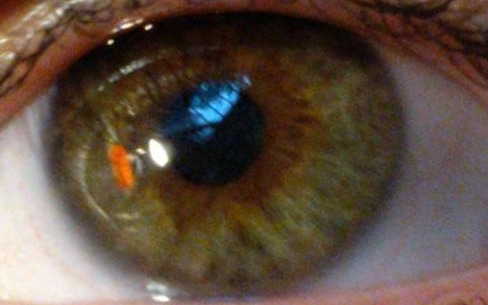
the orange lamp reflected in my eye there actually makes everything look MORE red-orange-yellow than it otherwise would. but it was the only decent source of light i had handy, since daylight was fading when i took this (as you can see from the blue rectangle reflected in there too)
despite the extra orange, the iris is still visibly dull green with grey flecks and a spiky ring of red-brown around the middle. you can see the overlap between sections as yellow.
bonus fun fact: people can acquire hazel eyes due to damage! mine have been this way since i was a kid, and are probably hereditary, but there are health conditions linked to the presence of lipofuscin in the eyes, so it's good to know the difference because it can literally be a sign of underlying illness.
hopefully now you understand the ways in which hazel eyes are distinct from brown. please also understand that you should not go around telling people they're wrong about their own bodies. that's fucked.
#stirring up trouble#for the record brown eyes are great. this isn't me protesting having brown eyes. i just. don't actually have them.#it's really more about the whole. yknow. being told i'm wrong abt myself at every turn re: gender and medical issues and such.#also. it does kinda piss me off when people 'correct' others with 100% incorrect information. anyway. bedtime for me.
4 notes
·
View notes
Note
What do you think of the following passage? “Invariably whenever right-wingers on social media starting debating whether they should repeal the 19th it hits them somewhere in the middle of the conversation: "Why are we talking about voting at all?" And really, within a traditional conservative gender paradigm, voting appears to be stereotypically feminine behavior; essentially passive, it seeks comity and consensus, based more on social intuition, the waveform of the opinion poll, than information. "Why did men ever vote?" is the question. The masculine approach to seeking a leader should surely involve some brute, individualizing test of reality rather than opinion, such as trial by combat. But sometimes these elements synthesize, the vote a referendum on some more or less sublimated moment of combat, e.g., a debate—or, for a more graphic example, when Trump's survival of the assassination attempt foreordained his election, as if it would somehow have been obscene not to elect him after that, with a shift in female voters his way despite his female opponent. Even in undemocratic systems, we often or always observe a moment of referendum, as popular cinema has recently instructed of the papal conclave, or as in the absolute monarch's canvass of his privy council. And, in counterpoint, even in democratic systems, a moment of sovereign decision stands outside consensus. Every regime is mixed. The quest for a female president has been a quest to see a woman wield not the plebiscitary power, old hat, but to see her wield sovereign power. Ironically, woman held plenty of sovereign power before the democratic age; an even older hat was the diadem. Democracy, as Burke long ago complained, had its bloody breech birth, the revolutionaries leaping feet first into progressive history from the womb of time, in the murder of the queen; communism is even worse, the princess slaughtered in the cellar (yes, Anastasia). A confusion, then, of my initial categories: democracy, male, a band of brothers; monarchy, female, our great mother. Democracy represents the brothers overthrowing mother and father; feminism is their sisters' demand to be granted an equal share in the power seized. Virginia Woolf said financial independence and the power to wield representational authority were both more important for women than the vote. Political power follows both economic and cultural power; these latter are the true sovereignties. This is how the franchise, originally the rock-paper-scissors of the fraternal horde in a primitive information environment, became archetypally feminine in the media age, the body politic passive beneath the thrusts of media and culture. The double question is what the future holds for this exchange of masculine and feminine partners in the dance of referendum and sovereignty. The monarch telepathically connected to the populace through its collective self-representation in the data stream? Perhaps. And perhaps the monarch will not even be human, will be the emergent intelligence of organized information, and therefore the synthesis of sovereignty and referendum as it is the transcendence of male and female. The 19th Amendment, and the First Commandment, will be therefore fulfilled in such extremity as to nullify themselves in the satisfaction that they have performed their historical roles.”
I think it is an unholy combination of pretentious postmodernism and misogynistic conservatism.
There are some interesting rhetorical tools employed that, if isolated from the whole, could have made for a powerful (if divisive) passage. However, as it is, the language is so convoluted it’s nearly uninterpretable, which may actually have been the goal.
---
A translation {plus commentary}:
Invariably whenever right-wingers on social media starting debating whether they should repeal the 19th it hits them somewhere in the middle of the conversation: "Why are we talking about voting at all?"
When conservative men start debating whether women should get to vote, they end up thinking voting/democracy is actually pointless.
And really, within a traditional conservative gender paradigm, voting appears to be stereotypically feminine behavior; essentially passive, it seeks comity and consensus, based more on social intuition, the waveform of the opinion poll, than information.
Voting is based on consensus-driven decision making (i.e., "majority rules"). Since compromise is actually a "feminine behavior," this means that voting is actually a "feminine behavior". {No evidence for the assertion that opinion and objective information are independent; completely ignoring the fact that they necessarily interact.}
"Why did men ever vote?" is the question. The masculine approach to seeking a leader should surely involve some brute, individualizing test of reality rather than opinion, such as trial by combat.
In contrast to women, men are inherently meant to employ violent and dominating methods of social control. Therefore, it doesn't make sense for men to vote. {"Men are inherently bad at democracy" is a hilarious position to base your misogyny on.}
But sometimes these elements synthesize, the vote a referendum on some more or less sublimated moment of combat, e.g., a debate—or, for a more graphic example, when Trump's survival of the assassination attempt foreordained his election, as if it would somehow have been obscene not to elect him after that, with a shift in female voters his way despite his female opponent.
But actually, modern political debates are a form of pseudo-combat. Also, the attempted assassination of Trump was the pinnacle of such pseudo-combat, and that's why he was elected and why female voters shifted to support him. {Absolutely no evidence provided that such a shift ever happened.}
Even in undemocratic systems, we often or always observe a moment of referendum, as popular cinema has recently instructed of the papal conclave, or as in the absolute monarch's canvass of his privy council.
Also, even in governments that are not democracies, the leader is still concerned with the opinion of those around him (e.g., the selection of a head leader by an unelected group, a monarch getting opinions from his advisory council).
And, in counterpoint, even in democratic systems, a moment of sovereign decision stands outside consensus. Every regime is mixed.
And sometimes democratically elected leaders have to make a final decision before gathering others’ opinions. Therefore, all governments are a mix of democratic and undemocratic decision-making.
The quest for a female president has been a quest to see a woman wield not the plebiscitary power, old hat, but to see her wield sovereign power.
Women want a female president not because they want a democratically elected leader to show a public consensus for supporting women, but because they want to see a woman get to have "final say" in undemocratic decisions. {Again, no evidence provided. Also, no commentary on what this assertion would mean for men's absolute resistance to a female president.}
Ironically, woman held plenty of sovereign power before the democratic age; an even older hat was the diadem.
And also this doesn't make sense, because before democracy there were queens. {Of course, no mention made of the fact that these queens were almost universally subordinate to their male relatives.}
Democracy, as Burke long ago complained, had its bloody breech birth, the revolutionaries leaping feet first into progressive history from the womb of time, in the murder of the queen; communism is even worse, the princess slaughtered in the cellar (yes, Anastasia).
{Likely a reference to} Edmund Burke, who commented on the French Revolution, believed democracy was "born" from violence (revolution) by men too quickly (i.e., he believed the shift from monarchy to democracy was too fast and that people were not ready for such systems of government). Two such examples were the murder of Queen Marie Antoinette (French Revolution) and Grand Duchess Anastasia (Russian communist revolution). {Again, ignoring the fact that both women were subordinate to their male family members, having little actual political power.}
A confusion, then, of my initial categories: democracy, male, a band of brothers; monarchy, female, our great mother.
This inverts the earlier categories of democracy as feminine and monarchy as masculine. In these examples, democratic men were overthrowing monarchical women. {Again, disregarding the historical inaccuracy.}
Democracy represents the brothers overthrowing mother and father; feminism is their sisters' demand to be granted an equal share in the power seized.
So men overthrew monarchies to establish democracy, women now want an equal share of that democratic power. {This time ignoring how the absolutely essential roles women played in every democratic revolution.}
Virginia Woolf said financial independence and the power to wield representational authority were both more important for women than the vote. Political power follows both economic and cultural power; these latter are the true sovereignties.
Virginia Woolf indicated that having a stable source of income was more important to her personal well-being than having the vote. Also, political power comes after economic and cultural power. {Which, yes, of course having a way to provide for her basic needs was more impactful than any political power. This is confusing the impact on individual well-being with the impact on classes of people. Political power makes slow changes to classes, but that does not negate its long-term importance to a group's well-being. This also ignores the tridirectional relationship between these sources of power.}
This is how the franchise, originally the rock-paper-scissors of the fraternal horde in a primitive information environment, became archetypally feminine in the media age, the body politic passive beneath the thrusts of media and culture.
In history, voting was a simple affair between men of the community. Nowadays voting is "feminine" because of the effect media has on people's opinions (i.e., media and culture are determined by the majority opinion which then influences voting behavior, so voting behavior is determined by the general "consensus", which we know is "feminine").
{Begrudgingly, I find the characterization of politics in relation to culture via the imagery of "thrusting" into a "passive body" clever. In a different context, this could have been the beginning of a social commentary on society's positioning of penetration as an act of dominance and comparison between such personal and public/political domination. Unfortunately, given the context it's likely he simply intended to invoke that characterization uncritically to further the characterization of democracy as a "feminine" entity.}
The double question is what the future holds for this exchange of masculine and feminine partners in the dance of referendum and sovereignty.
It is unknown how men and women's relationship to consensus-driven or singular political power will evolve in the future and also how the difference in political power between men and women will play out.
The monarch telepathically connected to the populace through its collective self-representation in the data stream? Perhaps.
Maybe there will be a single person in power who makes decisions based on the majority opinion, as defined by what people (or the media) say. {Thoroughly amazed that he seems to think this is possible.}
And perhaps the monarch will not even be human, will be the emergent intelligence of organized information, and therefore the synthesis of sovereignty and referendum as it is the transcendence of male and female.
Except actually, maybe this monarch will be an AI (which is based on the data given to it) and so political power won't be male or female. {This displays a complete ignorance of how AI works. Even if there exists a future in which such an AI could exist, it would still have been built off of existing data, and, therefore, any biases will be propagated into it.}
The 19th Amendment, and the First Commandment, will be therefore fulfilled in such extremity as to nullify themselves in the satisfaction that they have performed their historical roles.
Such a system will mean we don't have to vote anymore and also it will function as a sort of "god" (as an ultimate authority) with its decisions made based on the populace's opinion and therefore to be accepted unquestionably by that same populace.
---
Summary
When misogynistic men start debating whether women should get to vote they end up thinking voting is actually pointless and both a feminine (undesirable) behavior that simultaneously, paradoxically only exists because of men. However, this doesn't matter, because media and culture are way more important and also we will eventually be ruled by a gender-less AI.
Conclusion
The only thing more ridiculous than the ideas espoused is the purple prose he wrapped them in.
I'm not sure if this is what you were looking for Anon, but I hope it helped. (Heads up to others that I probably won't be answering similar "translation" asks in the future; at least not ones this long.)
4 notes
·
View notes
Text
Atlantis Expedition: Science Division Departments - Applied Sciences Department
The last of the science departments! Previously were the medical, life, and field sciences.
Below are the original notes, with one (1) revision:
Applied Sciences Department
> Head: Rodney McKay Radek Zelenka > Contains: Electrical/technical engineering, nuclear physics, civil engineering, astrophysics, laser/optical, chemical engineering > Function: Study, synthesis, and adaptations of Ancient technology > Examples of function: ZPM analysis with intent to duplicate, experimental duplications of Ancient technology materials, study of gate physics and construction with intent to duplicate, study and experimental duplication of other Ancient technologies (i.e. hyperdrives, cloaks, weapons, etc) > Personnel quantity: 1 (Head) + 3 (electreng) + 6 (techeng/gate techs) + 1 (nucphys) + 1 (astrophy) + 1 (LZ/opt) + 3 (chemeng) = 16 > A/N: The people Rodney are yelling at most often, because mistakes mean kablooey. Also a lot of the people running around in an emergency. 1 nuclear physicist because Rodney pulls a lot of intellectual weight, and same with the astrophysicist and laser/optical person (mostly they're there as on-paper hires and back-ups/assistants for him for his own research).
Revision because I do believe Radek would be in charge of a department, and this neatly explains why Radek is so often Rodney's functional second-in-command as well as the way they interact on a professional level.
Excepting the physicists (nuclear and astro), everyone here is an engineer or engineering-adjacent (see: gate techs).
Here's the breakdown, commentary included:
> Electrical Engineering » 3x of these » Specialties ⇛ Computer engineering ⟹ Hardware, software, computer architecture, computer design, robotics ⟹ Makes the databases, and also things like MALPs ⇛ Microelectronics ⟹ Study of and fabrication of microelectronics ⭆ The bits and bobs that make electronics ⟹ Semiconductor-adjacent work ⇛ Electronic engineering ⟹ Designs communication and instrumentation devices ⭆ Database architecture, signals between devices, etc » Outline of electrical engineering > Technical Engineering/Gate Technicians » SGC imports » 6x of these ⇛ Duties ⟹ Drafting of technical drawings ⟹ Gate address memorization and log maintenance ⟹ Mission log maintenance ⟹ Gate repair and maintenance > Nuclear Physics » Studies nuclear material and electron movements ⇛ AKA power source analytics » Also provides radiocarbon dating support to the Field Sciences team > Civil Engineering » Job of idiot-proofing » Studies the built world (infrastructure) » Useful for planning things like sewage systems, bridges, etc » Assists Field Sciences department with infrastructure design based on their feedback > Astrophysics » Does labwork and goes ooh at the telescope(s) » Analyzes data from telescopes and constructs planetary profiles and other celestial data » Assists with compilation of data from Field Sciences department > Laser/Optical » Creates, maintains, and compiles information from laser-based optical devices » Works with electrical engineers for development of new tools » Assists astrophysicist(s) with developing specialized tools for planetary analysis > Chemical Engineering » 3x of these » Slightly different role than the biochemical engineers in the Life Sciences department » Specialties ⇛ Materials science/Polymer engineering ⟹ Research and creation of new materials ⭆ Plastic-type and other malleable materials that aren't petrochemical-based ⇛ Semiconductors ⟹ Makes the semiconductors the other engineers are using ⟹ Also researches new ways to make semiconductors from new materials ⇛ Chemical process modeling ⟹ Computer modelling of new production processes ⟹ Primarily non-biologic chemicals and chemically-based outputs ⟹ Assists civil engineer in production processes for infrastructure modelling ⟹ The "fuck around and find out" person » Outline of chemical engineering
These are the people that, except for the head of the expedition, are the ones that make an expedition possible. Studying Ancient technology? This is the department. Setting up all the technology that everyone will be using, down to having a copy of Solitaire saved and inventorying down to the amount of solder? Once again, these people. Outside of the military factor - of which I presume there will naturally be quite a bit of overlap - the Applied Sciences are the ones to, well, apply the science.
Electric engineers are... I suppose a popular preconception of them is programming, if not a mental image of soldering pieces onto a motherboard. Neither is entirely incorrect, but it misses the broader scope of their training, and that is the design and construction of computers and their accompanying software. Whether a computer be a database system (think a cloud, or a company's digital storage) or a microprocessor that allows a robot to be a robot, these are also the people that generally end up in charge of the security of all electronics (see: hacking). Rodney McKay, as the CSO, will likely be one of two people (the other being the head of the expedition) holding the ultimate keys to this, but they'll likely be some sort of system administrators to handle the day-to-day work.
Gate technicians, while trained on the operation and maintenance of the gate and gate system - not an easy task in the slightest, and requiring a degree of fluency in Ancient and Goa'uld! - also handle a lot of the miscellaneous work that this department needs. Another shout-out to @spurious for prompting this idea, because there does need to be a group of people who do technical drafting, and the logic follows that they would also maintain records related to the usage of the gate, such as gate addresses (places visited, no-go addresses), mission details (liaison with the Field Sciences on managing pre- and post-mission information on planets and inter-planetary relations), and in general keeping track of what's going on regarding the gate.
Nuclear physics is here as an applied, rather than theoretical, position, keeping in line with the goals of this department. Primarily they would do power source analytics, being well-equipped to study radiation and electron movements, and parse such information for review. They would be doing a lot of labwork, and running lots of simulations on things like decay rates and energy throughputs of radioactive materials and different types of nuclear-type energy productions/storage containers (for the purposes of this headcanon, ZPMs are being lumped into this category despite being a solid state energy that functionally is not radioactive - there is a reason why Rodney's considered a ZPM expert).
Civil engineering is there, quite literally, to idiot-proof. This is useful around a crowd of engineers, and they also act as a useful translator for military parlance if a completely civilian engineer or scientist is in this or another science department. If you need a toilet, or a bridge, or putting up electric lines, this is your go-to person.
An astrophysicist on hand to study things like star charts (figuring out where you are in the new galaxy, especially in relation to the old one) and where other stargate would actually, literally be based on the constellations used as chevrons. They would be making the new maps, as well as assisting the Field Sciences department in the analysis of planetary physics from a distanced perspective. Their work will also put them in close relation to the gate technicians because of the amount of overlap in duties.
Laser and optical engineering is going to be immensely useful for this expedition, because not only will they help with making sure the electronics work, they can help with maintaining that, as well the operation and analysis of light-based scientific equipment. Think spectrometers, electron microscopes, and the like. A lot of Ancient and Goa'uld-adapted technology is likely to be laser- and optical-based, so this type of engineer will be useful for reverse-engineering and general dummy-testing.
Chemical engineers will, indeed, fuck around and find out. They're a little different than the biochemical engineers in the Life Sciences department, in that they wouldn't be dealing with the formulation of biologics and the tools to create such materials. Rather, they would be figuring out ways to make the things that everything is made out of - primarily plastic alternatives and other petrochemical alternatives. This would include everything from computer housings to wire insulation to, probably, the wires themselves (think fiber optics). If you're looking for an archetypal mad scientist, here's where you'll find them.
Given how closely aligned this department is with not only the IOA's goals for the expedition, but also the SGC's, it would be safe to assume that the members of this department will have some sway over the other departments. This would, of course, fluctuate based on the need of the given subject, but everyone in this department would quickly adapt to becoming the main people to assist the CSO in figuring out, repairing, and maintaining Atlantis as a whole.
Total Applied Sciences Department Personnel
Head of department: 1
Engineers: 7
Gate technicians: 6
Physicists: 2
Total total: 16
I'll be going over canonical personnel like Radek Zelenka and Miko Kusanagi in their own posts, but for now this is a general accounting of the expedition’s applied sciences department.
6 notes
·
View notes